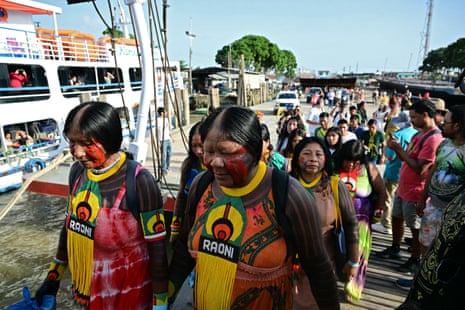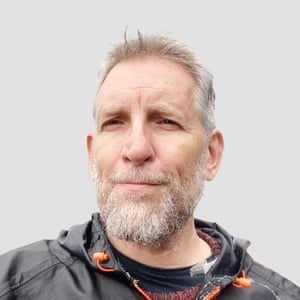Jonathan Watts
A fluvial adrenalin rush flooded into the COP30 host city of Belém on Wednesday morning with the arrival of a flotilla of more than 100 boats, carrying indigenous activists, forest defenders and other civil society campaigners.
Singing, chanting and waving flags and banners declaring “Fight for the Right to Life” and “No to Soy!”, the demonstrators made their presence evident on the river as they are expected to do on the streets in the coming days.
Organisers said 5,000 people from 60 countries were participating in the “Boats for Climate Justice Flotilla,” which converged on Guajará Bay close to the University of Pará, which will be the venue for a “People’s Summit” that runs for several days alongside the main climate talks.

Activists said they are already staging four events a day in Belém, the first COP host city in several years to encourage civil society participation.
Most of the events have been colourful and peaceful, but on Tuesday night there were scuffles in the conference centre when a group of several dozen indigenous and non-indigenous activists burst into the Blue Zone, where they were confronted by UN security guards.
More than 10,000 civil society activists are expected at COP30. They are united in their desire to protect nature and the rights and territory of traditional peoples. But there are many different strategies and focal issues, ranging across anti-dam protesters, river defenders, campaigners against agro-toxins, environmental justice advocates, demarcation supporters, and groups calling for direct payments to forest people for their role in maintaining globally important biomes.
In the flotilla, The Guardian counted at least 102 vessels, including Greenpeace’s Rainbow Warrior and the Imperatriz on which this reporter arrived in Belém. The organisers said 200 would take part over the course of the event. They have come from all parts of South America and Europe.
On board the main vessel of the “Answer Caravan,” which has travelled over 3,000 kilometers from the main Soy-growing region of Mato Grosso, carriyng more than 300 indigenous, riverine, quilombola and peasant leaders.
Among them was Maya-Lou Kayapo, who had spent the past six nights sleeping on a hammock. “We are here to resist the threats to our land from agribusiness and mining. We want to protect our territory from invasions and destruction,” she said over the din of chanting.
The ship was festooned with banners, highlighting the many threats to the Amazon, a globally important ecosystem that, scientists warn, been pushed close to the point of no return by human activities. : “We are the frontline of the climate crisis”, “Clean rivers without mining”, “Soy destroys”, “Demarcation now!”, “No Hydrovia!” (A reference to a contentious plan to turn the Tapajos and other rivers into a traffic corridor for soy barges.”
Several participants said they were united behind the vision of a “great cobra” – a dream spirit that has become a symbol of protest and has now taken physical form in a 50-metre-long inflatable snake. In Portuguese, the word “cobra” also means payment
Sarah Rodrigues, from the Volte Grande region of the Xingu river basin.carried a banner bearing the slogan: “Snake People” “The Cobra is the guardian of our campaign,” she said. “Financial support needs to go directly to the traditional peoples who protect the forest, not to the extractivist industries.”
Key events
Aseel Mousa
Brazilian Bruno Zanette, 26, is currently pursuing a Master’s in Eco Design. This year, he is attending COP with the Climate Clock, a global movement calling for action on the climate emergency.
“My motivation to attend COP began when I heard, back in 2023, that Brazil would host it. I’ve since tried to align my activism toward this moment. For me, COP isn’t just about negotiations — it’s a space for connection, listening, and learning from activists around the world. It’s where strategies are shared and where I hope to strengthen international bridges for climate action.
“The main climate challenges facing Brazil are deeply interconnected. In my home state, Rio Grande do Sul, we faced Brazil’s worst flooding ever in May 2024, which killed over a hundred people and destroyed entire communities. It showed how climate change, combined with poor preparation and the weakening of environmental protections, can devastate even wealthy regions. Across the country, droughts, deforestation, and new agribusiness-driven laws are worsening the situation.
“At this COP, I don’t expect miracles from negotiations, but I hope we’ll use this moment to ignite real awareness in Brazilian society and push for the country to embrace its potential as a genuine climate leader — not an oil producer expanding into the Amazon.”

Fiona Harvey
Fear of being bullied by Donald Trump may have prompted Bill Gates to row back on the climate crisis, the former US vice president Al Gore has speculated, as he slammed the billionaire as “silly”, and the US president for his anti-climate stance.
Trump, “the most corrupt president in American history”, was “badly damaging the US economy” by pulling away from renewable energy and promoting fossil fuels, Gore warned.
“He’s already doing a lot of damage [on the climate],” Gore said, in an interview with the Guardian at the Cop30 UN climate summit in Brazil. “Maybe the biggest harm he’s doing is to the United States itself, and one figure now illustrates it. China is now exporting green technology to the rest of the world that has a cumulative export value that is significantly higher than all of the fossil fuel exports from the United States to the rest of the world. And that trend is obviously accelerating quite dramatically.”
Gates, a philanthropist and founder of Microsoft, made waves around the world when he publicly argued for pushing the climate crisis down the international agenda, in favour of more focus on health issues.
“The idea of slowing down on climate again, every climate scientist that I know and respect just threw up their hands and said, ‘What in the world is he thinking?’” said Gore, in an interview with the Guardian at the Cop30 UN climate summit in Belem. “When Trump was elected the second time, Bill fired most of his climate staffers and went to the White House and lavished praise on Trump, and then put out this series of statements last week that puzzled anybody who was really concerned about the climate crisis.”
Gore noted that the chiefs of many large businesses in the US are in fear of reprisals from the US president if they disagree with him. “It may be that he is really worried that Trump will bully him the way he has bullied other ultra wealthy business people. It looks like it may be possible that he’s scared of Trump.”
The US president responded with social media posts praising Gates’ reversal.
Gore said: “I don’t know why [Gates] would do this… the only rave review of what he put out last week was from Donald Trump. Yeah,Trump loves it. That may be what Gates was shooting for.”
Gates and Gore were formerly seen as philanthropic allies in the fight against major problems facing humanity, including the climate crisis, appearing at the same events to warn of the consequences for humanity and the need to act.
Setting up the climate crisis and the global health crisis as opposing choices for intervention, as Gates appeared to do, was wrong, added Gore. “The idea that there is a binary choice between health and climate is an idea that’s been roundly rejected by virtually every scientist in this field, and the World Health Organisation has said long since that climate is the number one health threat to humanity.”
He added: “I almost felt badly for Bill when the same day he put his statement out the Lancet, the very authoritative, deeply respected Lancet Commission, put out its latest report showing the enormous health consequences of not accelerating climate action. The idea that you have to choose one over the other is quite silly.”
Instead of taking money away from climate action, Gates should have advocated that governments re-purpose the hundreds of billions they spend giving subsidies to fossil fuels, and focus them on health instead, Gore argued. “It’s literally insane that governments around the world are forcing their taxpayers to subsidise the destruction of part of humanity’s future,” he said. “Accelerating solutions to the climate crisis is one of the single most effective ways to improve health care in the world.”
Gore also robustly defended the UN process of annual “conference of the party” meetings on climate. “The cop process accomplishes far more than it is given credit for accomplishing, partly because it serves as a nucleus for all of the industry and NGO and trade groups and civil society groups that assemble at cop every year, and many of them come up with their own agreements that move things forward.”
Industries and governments were pushing ahead with new technology and implementing renewable energy and other low-carbon initiatives, he said. “The achievements of each successive cop are often cumulative, and the Cop process itself is one of the principal reasons that the sustainability revolution has shifted into high gear, and more and more nations are now realising that this is the future.”
He said: “There is a lot of very positive progress underway. It’s just stunning to watch the progress in these solutions [to cutting greenhouse gas emissions and shifting to a low-carbon economy.] There’s a completely false view out there that somehow we are losing ground.”
Although temperatures have for two years surpassed the vital threshold of 1.5C above pre-industrial levels, there was still time to avoid the worst ravages of the climate crisis if governments acted now, Gore said. “We still have agency. It is certainly not too late to avoid the catastrophic harms that the scientists have have been warning us about, but every 10th of a degree matters. We are recklessly moving toward some negative tipping points that we need to avoid. So it’s not too late, but it’s time for us to to accelerate action.”
He added: “All around the world, people are listening to the most powerful voice in this entire global debate, and that voice is the voice of Mother Nature.”
Gore also celebrated what he sees as a “generational change” in the US, by which many people are turning towards climate action even while the federal governments is dismantling it. He warned that Trump might face a “less obsequious” Congress, in the light of the series of election defeats for Republican candidates at US elections last week.
“The American people spoke pretty loudly and clearly last week, in unexpectedly large landslide defeats for Trump in every election that was on the ballot, and Republican senators have now begun to break with him on some of his priorities,” said Gore. “It may be that going forward, he will have a less obsequious Congress that is not as terrified of him as they have been in his first year.”
Gore had some praise for Zohran Mamdani, the progressive politician who was elected mayor of New York. “Some of his proposals were ones that I did not agree with, but I thought that he ran a stunningly effective campaign. His basic skills as a politician were impressively on display.”

Jonathan Watts
A fluvial adrenalin rush flooded into the COP30 host city of Belém on Wednesday morning with the arrival of a flotilla of more than 100 boats, carrying indigenous activists, forest defenders and other civil society campaigners.
Singing, chanting and waving flags and banners declaring “Fight for the Right to Life” and “No to Soy!”, the demonstrators made their presence evident on the river as they are expected to do on the streets in the coming days.
Organisers said 5,000 people from 60 countries were participating in the “Boats for Climate Justice Flotilla,” which converged on Guajará Bay close to the University of Pará, which will be the venue for a “People’s Summit” that runs for several days alongside the main climate talks.
Activists said they are already staging four events a day in Belém, the first COP host city in several years to encourage civil society participation.
Most of the events have been colourful and peaceful, but on Tuesday night there were scuffles in the conference centre when a group of several dozen indigenous and non-indigenous activists burst into the Blue Zone, where they were confronted by UN security guards.
More than 10,000 civil society activists are expected at COP30. They are united in their desire to protect nature and the rights and territory of traditional peoples. But there are many different strategies and focal issues, ranging across anti-dam protesters, river defenders, campaigners against agro-toxins, environmental justice advocates, demarcation supporters, and groups calling for direct payments to forest people for their role in maintaining globally important biomes.
In the flotilla, The Guardian counted at least 102 vessels, including Greenpeace’s Rainbow Warrior and the Imperatriz on which this reporter arrived in Belém. The organisers said 200 would take part over the course of the event. They have come from all parts of South America and Europe.
On board the main vessel of the “Answer Caravan,” which has travelled over 3,000 kilometers from the main Soy-growing region of Mato Grosso, carriyng more than 300 indigenous, riverine, quilombola and peasant leaders.
Among them was Maya-Lou Kayapo, who had spent the past six nights sleeping on a hammock. “We are here to resist the threats to our land from agribusiness and mining. We want to protect our territory from invasions and destruction,” she said over the din of chanting.
The ship was festooned with banners, highlighting the many threats to the Amazon, a globally important ecosystem that, scientists warn, been pushed close to the point of no return by human activities. : “We are the frontline of the climate crisis”, “Clean rivers without mining”, “Soy destroys”, “Demarcation now!”, “No Hydrovia!” (A reference to a contentious plan to turn the Tapajos and other rivers into a traffic corridor for soy barges.”
Several participants said they were united behind the vision of a “great cobra” – a dream spirit that has become a symbol of protest and has now taken physical form in a 50-metre-long inflatable snake. In Portuguese, the word “cobra” also means payment
Sarah Rodrigues, from the Volte Grande region of the Xingu river basin.carried a banner bearing the slogan: “Snake People” “The Cobra is the guardian of our campaign,” she said. “Financial support needs to go directly to the traditional peoples who protect the forest, not to the extractivist industries.”

Damian Carrington
Here’s a little timeline cleanse amidst the serious business of Cop30. Or in fact a big one – very big.
A new, double-headed floating wind turbine is set to obliterate the record for the largest turbine. It will be not far off a kilometre wide and rival the Empire State Building in height, generating 50MW of power – double today’s largest turbine.
It is being built by Ming Yang Smart Energy in China and the company has already deployed a 16MW version of the device (pictured below), which is called OceanX. The prototype has survived multiple typhoons, the company says.
“If successful, this model can be a game changer in the floating wind industry,” Umang Mehrotra, at research firm Rystad Energy, told Scientific American.
The Age of Electricity is here, the International Energy Agency said today in its flagship annual report. Even if all climate action halted today, renewables would still grow faster than any other major energy source – their cheapness means their growth is locked in.
China knows this – it also reported today its first month where more than half of new cars sold were electric.
The US, under Trump, does not. The IEA’s central scenario projects that Trump’s anti-climate policies means the US will have about 30% less solar power by 2035 than forecast last year.
Hello, Matthew Taylor here. I will be running the liveblog for the next few hours, keeping across on the latest developments from Day 3 at Cop30.
We had protests overnight and there are more planned for this morning. But as we wait for things to get going in Belem it is worth flagging this piece by my colleague Nina Lahkani highlighting the health impact of fossil fuel projects around the world.
Day three begins at Cop30
Dharna Noor
The second day of Cop29 ended with a bang, as dozens of Indigenous protestors forced their way into the conference center. The demonstrators, some of whom wore headdresses and carried instruments, pulled doors from their hinges, shoved through security scanners, and tussled with guards before successfully entering the venue. “Our forests are not for sale,” one protestor’s sign read.
It’s a sign that this year marks the return of major protests at UN climate talks, after several years of repression. More demonstrations are planned at the venue for the rest of the week, both on and off site.
Some 50,000 people are attending Cop30, from the civil society groups holding rallies, to the researchers poring over esoteric documents, to the politicians huddling together in brightly lit rooms. One group, however, is conspicuously absent from the climate talks: a delegation from the US, the world’s largest historical greenhouse gas polluter.
It’s the first time the US has sat out the negotiations completely, research organization Carbon Brief confirmed on Tuesday. US president Donald Trump, who calls the climate crisis a “hoax,” pulled the country from the Paris Agreement in January as part of an all-out assault on climate policy.
California governor Gavin Newsom, who arrived at the climate talks on Tuesday, strongly condemned Trump’s anti-environmental agenda: “He’s an invasive species, he’s a wrecking ball president,” he said at a press conference. “He’s trying to roll back progress of the last century, he’s trying to recreate the 19th century, he’s doubling down on stupid.”
Newsom, whose state has the world’s fourth-largest economy, is the topmost US official at Cop29. Everywhere he went on Tuesday, he was followed by hoards of spectators. In meetings and press conferences, he assured crowds that California is committed to climate action.
“The United States of America is as dumb as we want to be on this topic, but the state of California is not,” he said at a meeting earlier Tuesday. “And so we are going to assert ourselves, we’re going to lean in, and we are going to compete in this space.”
Response to the US’s absence has been mixed. On Monday, Tuvalu’s Home Affairs and Environment Minister Maina Vakafua Talia said Trump’s withdrawal showed “a shameful disregard for the rest of the world.”
But on Tuesday, Christiana Figueres, former executive secretary of the United Nations framework convention on climate change, said on Tuesday that the US’s absence from the talks “actually is a good thing.”
“Ciao, bambino,” was her response to the US’s departure from the Paris agreement.
At a press gaggle, Newsom said: “That’s a hell of a statement coming from the mother of the Paris Agreement.” Trump’s absence “creates opportunity” for local leaders to step into the fold on climate policy, Newsom said.
“What stands in the way becomes the way. This is an opportunity for us bottom up at the local level to assert ourselves,” he said. “He pulled away. That’s why I pulled up.”
Tuesday was a big day for the showcasing of local climate leadership, said Ana Toni, Cop30’s CEO, at an evening press conference. More than 185 city representatives met to speak about adaptation to extreme heat, and more than $20 speak about about concrete action to beat the heat and financing for it, she said.
Subnational actors can make a major difference in climate policy, including in the US, studies show. But Trump could still attempt to derail that progress, some have warned. Cop30 are especially concerned in light of the Trump administration’s behavior at an international maritime meeting last month, where officials menaced some foreign leaders and threatened tariffs on those who supported a carbon fee on shipping.
Tomorrow morning, activists will hold another protest, placing the spotlight on Trump specifically. They will hold a banner that says “resist climate saboteurs,” adorned with an outline of the US president.
“Trump’s lack of presence so far is a blessing in disguise, but you never know when he’s going to try and botch the talks,” activist Denise Robbins, an organizer of the action, told the Guardian.
She urged global leaders to resist any pressure they may face from the US. “No matter what happens in the US, the rest of the world needs to come together and act on climate,” she said. “It’s the only way we’ll keep to the goals of the Paris climate agreement.”








